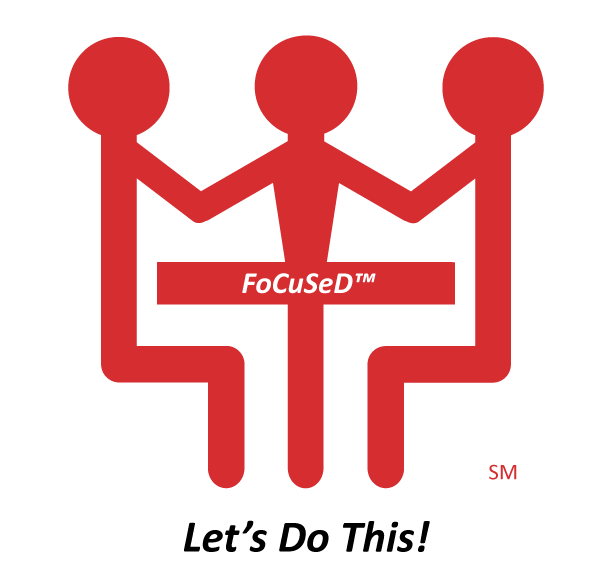August 2007 - The FoCuSeD™ Facilitator eNewsletter

JAD? FAST? It's time to get FoCuSeD™ | Gary Rush Facilitation
In 1978, JAD was created – it introduced structured facilitation and brought facilitation to IT.
In 1985, Gary created – FAST – a revolution from JAD. It incrementally improved JAD by including more processes and information about group dynamics. FAST gave you JAD and more, bringing structured facilitation to IT and to Business.
Until now, facilitation techniques have been either about structure or about group dynamics. Even FAST was biased towards structure with some information about group dynamics included because Gary knew something was needed regarding the group and the transformation of the participants into a group.
In 2007, Gary created – FoCuSeD™ - the next revolution in structured facilitation – a revolution from FAST! FoCuSeD™ is an approach to information gathering where facilitated workshops replace individual interviews. It defines the seamless integration of process and group dynamics expanding processes to cover any group activity applicable in business and in life. The process to build agendas and deal with people is the same whether you are dealing with business, technical, or any other type of subject. You must proactively plan the emotional process to develop the product. One without the other is fruitless. FoCuSeD™ fully integrates methodologies with communication and group dynamics to derive consensus-based information. With FoCuSeD™, you get JAD, FAST, and more, bringing a holistic approach to structured facilitation – the 1st Holistic Facilitation Technique. ![]()
Facilitation Skills in Business and in Life
In June 2007, the United Nations released a report entitled, “Participatory Dialogue: Towards a Stable, Safe, and Just Society for All”. “The report also presents a range of practical tools and methodologies that fall under the broad umbrella of “participatory dialogue”, serving purposes ranging from increasing mutual understanding through facilitating to create collective visions of the future to joint decision-making and collaborative action, as well as building skills and capacities.” The report reinforces facilitation, collaboration, and diversity as critical and essential to society.
I use my Facilitator skills, as a leader, as a member of a group, and always, working with others. Why should facilitation skills be of interest to everyone?
In learning facilitation skills, we learn:
- How to understand and work with a diverse group of people.
- How to be “not in charge”.
- How to get others to come together, step through a thought process, and accomplish something.
- How to get up in front of people and speak with confidence.
- How to engage people so that everyone gets involved.
- How to move a group of people towards consensus.
Understand and work with a diverse group of people.
Learning to understand and accept people who are diverse is essential. I’ve had the opportunity to deal with people from all over the globe, from different backgrounds, with different views and values, and the differences are exciting, interesting, and challenging. When we accept others and listen to what they have to say, we stop judging. As a Facilitator, you learn how to actively listen, and you learn more as a result. You listen before you decide and you don’t look at situations as having only one solution.
Be “not in charge”.
Learning to back off, letting others be in charge, requires trust. As a Facilitator, you learn the value of the group – the wisdom of others – to enable others to do the work. Working with a group, as a leader or manager, I’ve learned that dictating is not the answer. Sometimes (many times) it is better to let others be in charge. It lets others know that you trust their abilities. That’s one of the most difficult lessons for a Leader to learn. It’s surprising and humbling when you find that others can actually do a better job at something than you can. We are always greater as a whole than the sum of the parts.
Get others to come together, step through a thought process, and accomplish something.
People need a thought process – “how are we to do this?” In preparing for workshops, Facilitators study processes and learn how to design a process that enables a group of people to accomplish something. Understanding basic processes and how to develop processes gives you direction and is helpful and useful to follow in business and in life.
Get up in front of people and speak with confidence.
This is the number one fear – fear of public speaking (over and above the fear of dying!). Facilitators learn techniques to manage their fear so that they can do what is needed to accomplish something. Practicing being in front of people and interacting with them, helps you feel less pressure to “perform.” By the way, you never overcome the fear – you simply learn to manage it.
Engage people so that everyone gets involved.
In groups, do a few people dominate the discussion or solutions? Are those who don’t participate too shy? Are their ideas less valuable? Better ideas come when everyone is involved. Facilitators learn how to involve everyone. Whether it’s an exercise or a probing question, getting everyone involved increases the quality of the discussion and the quality of solutions.
Move a group of people towards consensus.
Consensus is a great concept but people need to learn how to get there. (See “Holistic Parallel Process Development”.) Whenever I’m working with a group, I know that I have to get everyone to participate (diverge), disagree (struggle), and then move to consensus (converge). I use this thought process in any capacity. It helps ensure that everyone is included and all ideas are heard so that we can reach consensus.
So, why learn Facilitation skills? Facilitation skills are helpful and useful in everything you do. They are a set of behavioral skills that happen at the personal, organizational, and societal levels. ![]()

